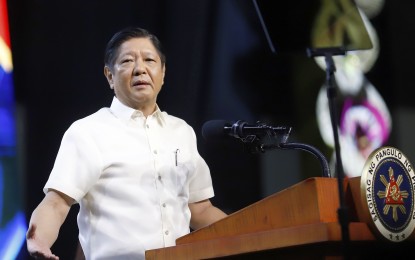
President Ferdinand R. Marcos Jr. (File photo)
MANILA – President Ferdinand R. Marcos Jr. has directed the Inter-Agency Council Against Trafficking (IACAT) and the Presidential Anti-Organized Crime Commission (PAOCC) to step up and harmonize government and private sector efforts in combating human trafficking, which he said, could compromise the country’s economy and national security.
“The IACAT and the PAOCC must take the lead in harmonizing government initiatives, public private partnerships to thwart the business of human trafficking in its multifarious operations on the ground and now becoming more and more important online,” Marcos said during briefing at Malacañan Palace on problems posed by human trafficking.
Marcos specifically directed the Presidential Communications Office (PCO) to assist the IACAT in launching a communication campaign that will educate the public about the danger posed by syndicates engaged in trafficking of persons.
The President said he believes that good information spearheaded by the PCO is always a key element in preventing all the terrible abuses being committed against victims of human trafficking.
“So heightened public awareness is key. That’s what we spoke about a little bit earlier. The Presidential Communications Office must assist IACAT in its communication campaign against trafficking in persons in order to amplify the effort,” he said.
He directed those agencies to halt the operation of human traffickers who exploit physical and economic weaknesses of vulnerable people especially women and children.
As the world celebrates International Women’s Day this March, the President said: “We are honoring women this month. So let us make sure that we take this time to look after their collective rights and interests in the enforcement and in the measures to remedy all that we implement.”
Trafficking in persons has been an ongoing problem for many countries especially as the global economy recovers from the coronavirus pandemic, which made life harder for many people, the President noted.
People without work and a source of livelihood make them more vulnerable to human traffickers and it’s the time for government intervention and protection, he added.
“I think the room for improvement here is that we can work together more and coordinate together more and where – that puts meat on the bones of what we have come to call the whole-of-government approach and bring everything to bear to the problems that we are facing,” Marcos said.
It is fortunate, he said, that the country managed to repatriate human trafficking victims from Myanmar despite the ongoing civil unrest in that country.
Marcos also raised the need for the Philippines to maintain its status in the tier system and “we must make sure that we do not fall out of Tier 1 into another tier.”
“I remember Secretary Toots (Ople) and I started on this campaign to remove us from Tier 2. We are in danger coming down to tier 3 at the time. So we managed to take us back up to Tier 1. And let’s just make sure that the Tier 1 categorization or status of the Philippines is not put in any danger,” he said.
The Trafficking in Persons Office within the US Department of State conducts a yearly assessment to monitor all countries’ efforts to combat human trafficking and provide each country with a grade according to a 3-tier scale.
Countries and territories under Tier 1 fully comply with the minimum standards while those under Tier 2 do not fully comply with the minimum standards but are making significant efforts to bring themselves into compliance with those standards. (PNA)
